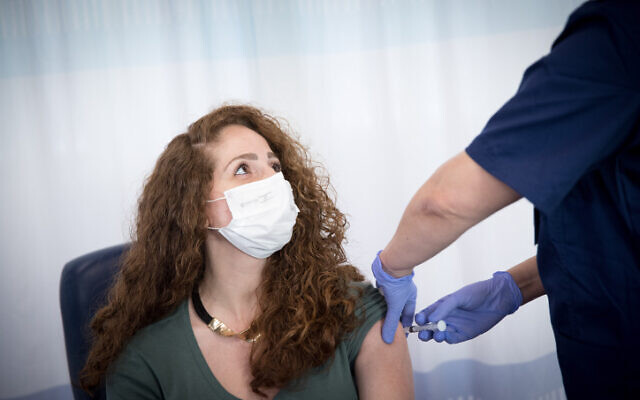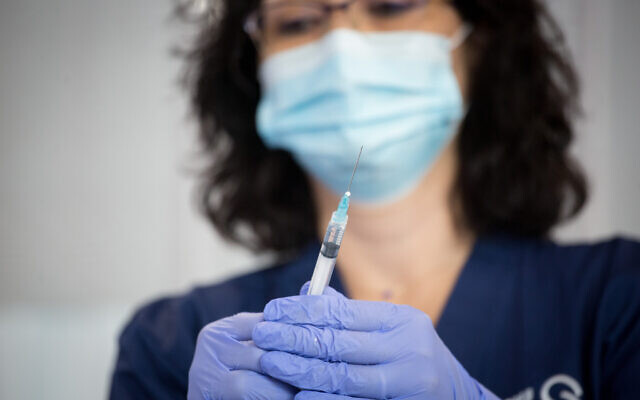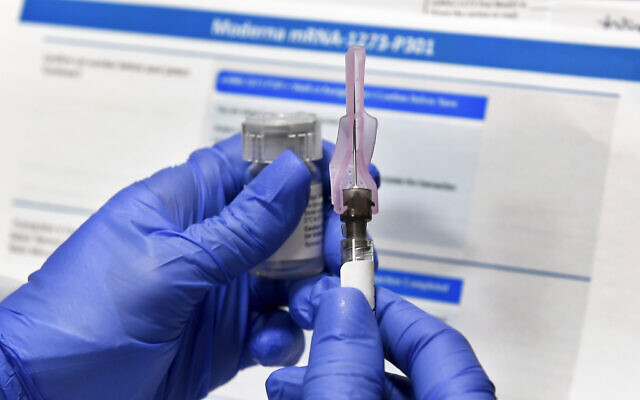Israel’s vaccination campaign will start Sunday with shots for frontline health workers, but two main HMOs said to be telling government they are ready to step up efforts

Israel’s two largest health maintenance organizations (HMOs) are reportedly asking the government to let them begin mass vaccinations from Monday, a day after the country starts administering the coronavirus shots to front-line health workers.
The Health Ministry on Wednesday released a detailed list of who would be inoculated first when the vaccine drive kicks off on Sunday.
Topping the list were hospital workers, followed by employees of HMOs, private health clinics, and dental offices; medical and nursing students taking part in clinical rounds; members of Magen David Adom and other ambulance services; and residents and caregivers at senior living homes.
Later on in the initial stage, the Health Ministry said, those in risk groups and anyone over 60 would be vaccinated at HMOs. Next will be those with medical conditions that put them at particular risk; Israelis working in jobs with high exposure of risk to the virus, such as teachers, social workers, first responders, and prison staff and prisoners; and Israel Defense Forces soldiers and other security personnel.
Last will come the rest of the population, with a timeline depending on how many doses arrive in Israel and the level of demand by the priority groups. Prime Minister Benjamin Netanyahu said that if there is a surplus of doses, the general public will be permitted to get the vaccine sooner.
However, the Kan public broadcaster reported late Wednesday that the Maccabi and Clalit HMOs have requested to receive tens of thousands of doses in order to already start vaccinating the general population, particularly those considered high risk, from Monday.
The other two HMOs, Meuhedet and Leumit, plan to start on Wednesday, the report said.
However, the report said that in the first few days the vaccine would only be available in major cities.

The government set a target of 60,000 vaccinations a day once the drive begins, meaning two million Israelis could be vaccinated by the end of January.
Along with some four million doses from Pfizer expected to arrive by the end of the month, Channel 12 said Wednesday that another four million were expected to come by the end of March for a total of eight million doses — enough to vaccinate four million people.
The network said Moderna’s vaccine, which could receive emergency approval from US regulators within days, as well as a vaccine being produced by AstraZeneca, are not expected to arrive in Israel earlier than April.
The vaccine drive comes as the government was said mulling new restrictions on the public, given rising infection numbers.
Israel is contending with a marked rise in new COVID-19 cases, with infections surging to almost 3,000 on Tuesday, the highest caseload in over two months.
Interior Minister Aryeh Deri said that if cases continue to rise, the government would need to approve its “tightened restrictions” plan.
“We’re on the way there, unfortunately,” he told Channel 12 news.
These are expected to include the closure of shops, malls, and outdoor markets, as well as schools in high infection areas. Channel 12 news said health officials believe commerce could be shuttered within five days.
According to the network, if those moves do not successfully bring down the infection rate, Israel could reach a full lockdown in three weeks’ time.
The government-set benchmark for reimposing restrictions is an average of 2,500 daily cases over an entire week or a basic reproduction number of over 1.32. That figure was at 1.27 last week, according to the Health Ministry. Any value over one means the virus infection rate is increasing.

The Health Ministry said Wednesday that 2,888 new cases were diagnosed the previous day, the highest since October 12 and a significant leap compared to Monday, which had 2,279 cases confirmed. The number of new cases was partly a reflection of the large number of tests conducted, 82,120, a daily record since the start of the pandemic.
However, the rate of tests to come back positive was also on the rise and reached 3.5 percent, the highest daily rate in almost two months for a weekday. Testing levels generally drop on weekends, with the positivity rate temporarily rising.
With another 1,476 infections confirmed on Wednesday, the total caseload since the pandemic began reached 364,320. Active cases soared to 20,255, including 393 patients in serious condition and 152 on ventilators.
The death toll grew to 3,031.
Israel has already had two national lockdowns since the outbreak began in March. Some restrictions from the second lockdown, limiting public life, are still in place.
As reported by The Times of Israel
